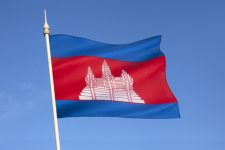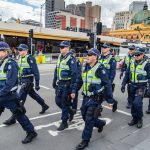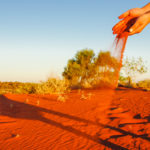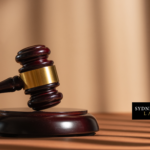Australian Journalist Imprisoned in Cambodia Seeks Royal Pardon

A three-judge panel of the Phnom Penh Municipal Court found Australian journalist and documentary film-maker James Ricketson guilty of espionage on 31 August. And to the disbelief of those gathered there to support the 69-year-old, the court sentenced him to six years in prison.
Following the handing down of the verdict, Mr Ricketson turned to the gallery and asked, “Which country am I spying for?” Indeed, that question was never answered by the prosecution throughout the entire proceedings, despite repeated requests from the defence.
Mr Ricketson was arrested on 3 June last year, after flying a photographic drone over a political rally organised by the now banned Cambodia National Rescue Party (CNRP). He was subsequently remanded in the Cambodian capital’s overcrowded Prey Sar prison up until his conviction.
The Sydney man has been making documentaries about life in Cambodia since 1995. He also provided financial support to poor local people he befriended. But, the judges ruled that this was a front he used whilst collecting information that was detrimental to the nation’s national security.
“James has done a lot of good here, nothing to do with spying,” the journalist’s lawyer Kong Sam Oun said on the day the trial ended. But, rather than appeal his conviction in the courts, Mr Ricketson has now decided to seek a royal pardon.
Health concerns
James’ son, Jesse Ricketson, moved to Phnom Penh after James’ arrest to provide his father with support. Mr Ricketson described the conditions in Prey Sar prison as “incredibly difficult” for his father, who “is old and in failing health.”
“He’s crammed into a tiny cell with 140 other inmates. Prisoners must lie on the ground squished in together with very little space,” Mr Ricketson told Sydney Criminal Lawyers®. “There is very poor food provided such that basically all provisions must be brought in from the outside on a regular basis.”
Mr Ricketson said his father has been suffering a persistent undiagnosed chest infection, as well as various skin conditions, rashes and scabies. He explained that it was “virtually impossible to get rid” of these ailments due to his constant contact with the other prisoners.
Another major concern for the Ricketson family is that medical care is almost non-existent in the prison. “We are constantly terrified about what might happen if he were to have a stroke or something serious like that in a place with no medical care,” Mr Ricketson stressed.
Lack of concrete evidence
The evidence presented to the court alleging the journalist was a spy comprised emails and photographs dating back to 2015 that had been taken from Mr Ricketson’s computer.
The emails were sent to journalists, non-government organisations and politicians as part of Mr Ricketson’s regular work as a journalist. And while he’d been critical of the current Cambodian government, he hadn’t divulged any information that could threaten national security.
Emails that were scrutinised by the court included one to former Australian prime minister Malcolm Turnbull, and another that was sent to the founding president of the now defunct CNRP opposition party Sam Rainsy.
A dozen photos were also produced that showed police and riot squad in formation at demonstrations that took place during the 2013 elections. The prosecution implied the photos were taken in restricted areas, but there was no evidence to support this.
After the prosecution put forth its evidence, Ricketson’s defence team believed the case against the journalist was so flimsy that it didn’t warrant a rebuttal. “According to the evidence put forth by the prosecution, I don’t need to produce a defence,” Mr Kong said.
On the last day of the trial, prior to the verdict being delivered, Mr Ricketson seemed optimistic saying, “I hope I am free today and I could go home.”
Increasingly autocratic rule
The arrest and detention of Mr Ricketson comes during a time when Cambodian prime minister Hun Sen has been silencing opposition to his rule. The leader of the Cambodian People’s Party (CPP) has held office for the last 33 years.
In September last year, then CNRP leader Kem Sokha was imprisoned after being found guilty of treason. Mr Hun accused him of conspiring to topple the government as part of a so-called “colour revolution” that had the backing of the United States.
Then a government-filed lawsuit against the CNRP saw the Cambodian Supreme Court order that the main opposition party be disbanded in November. This ensured against any threat to the PM’s victory in this year’s election, after the CNRP garnered 44 percent of the vote in the 2013 election.
In the lead up to the general election in July this year, the government carried out a crackdown against independent media, civil society groups and non-government organisations. And this resulted in an election outcome that saw the CPP claim all 125 seats in parliament.
Support from back home
The Australian Directors Guild, along with the Cambodian Australian Community have called on the Morrison government to take action on Ricketson’s behalf. While Human Rights Watch’s deputy Asia director Phil Robertson has condemned the government’s “softly-quietly” approach.
Following the outcome of the trial, Australian prime minister Scott Morrison said Mr Ricketson would receive consular support. And foreign affairs minister Marise Payne said the government would consider appropriate support after Ricketson had decided what avenue to take next.
On humanitarian grounds
Cambodia is a constitutional monarchy, similar to Australia. Under Cambodian law, it is possible to seek a royal pardon if the appeals process has been dropped. Mr Ricketson’s has decided to take this path and ask King Norodom Sihamoni for a pardon.
Criminal defence lawyer Mr Kong announced he was preparing the request for a pardon late last week. He said the documents would be sent early this week to the government, which would then make the request to the king.
Jesse Ricketson said the Australian government has indicated it will throw its full weight behind the submission. He explained they’re taking this approach on humanitarian grounds.
“The request is for compassion and mercy for an elderly man in poor health to be let out of those incredibly difficult conditions and allowed to return to his family,” he concluded.








